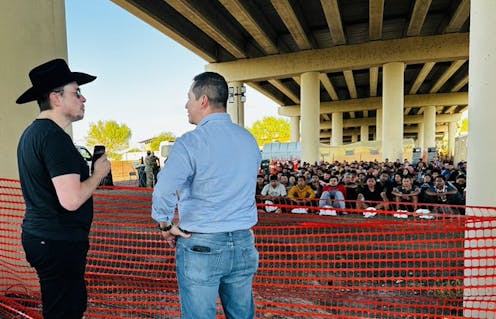
In late September, Elon Musk, the tech billionaire behind Tesla and SpaceX, set the internet ablaze with his visit to the Texas-Mexico border to provide what he called an “unfiltered” perspective on the border crisis as thousands of migrants, mostly from Venezuela, crossed the Rio Grande River.
In a video at Eagle Pass, Texas, Musk calls for a “greatly expanded legal immigration system” that would welcome “hard-working and honest” people and “not let anyone in the country who is breaking the law.”
Many were quick to highlight the absurdity of the world’s richest person, who is himself an immigrant, standing before a group of other immigrants calling for stricter policies.
Pro-immigrant but anti-asylum?
Musk’s position on immigration appears convoluted. On the one hand, he says he is “extremely pro-immigrant,” given he is an immigrant to the United States himself. This also makes sense from the perspective of his businesses, which rely on highly skilled migrant workers.
While Musk said he supports legal immigration, he said the U.S. should “not be allowing people in the country if they are breaking the law.” A day before his visit to the border, Musk tweeted support for a Trump-style wall to securitize the border. He implied that asylum seekers were entering without evidence to support their claims and they could “literally Google to know exactly what to say” to border officers.
Musk’s peddling of right wing anti-refugee rhetoric isn’t surprising, but the misinformation shared in Musk’s self-proclaimed “unfiltered” video may inadvertently bolster border militarization, increased repatriations and the criminalization of vulnerable asylum seekers.
For example, during Musk’s border visit, congressman Tony Gonzales shares an anecdote about an asylum seeker he saw that had teardrop tattoos on their face. Musk calls this person a “serial murderer and proud of it” and made the leap that America has become the place people “go to escape the law.”
This kind of language plays into tropes that paint immigrants as dangerous and criminal. However, research has demonstrated that immigrants are not more likely to commit crimes. Research from 2022 found U.S. citizens are more than two times more likely to be arrested for a violent crime than undocumented immigrants.
In the video, Gonzales claimed there has been zero repatriation. However, 3.6 million people who have crossed into the U.S. illegally have been repatriated since Biden took office. Soon after Musk’s visit, Biden announced that the U.S. was resuming direct repatriation flights for Venezuelans who unlawfully cross the border and have no legal basis to stay.
An open border for all of Earth?
The most troubling and sensationalist claim that Musk makes is that the U.S. southern border is an “open border for all of earth…an open border to 8 billion.” Not only is this statement far from the truth, it plays into tropes that immigrants and refugees from the Global South are invading western countries.
It’s a dramatic misconception of the realities of global migration and displacement. The vast majority of refugees are hosted by countries in the Global South.
For example, displacement from Venezuela is now the largest refugee crisis in the world, outpacing refugees from Ukraine and Syria. Of the 7.7 million displaced, 85 per cent have moved to neighbouring Latin American countries. Only around 700,000 are in the U.S. under temporary protection status, which is only nine per cent of the total displaced population.
The claim that the U.S. border is open “for all of earth” is plainly wrong, and gives the U.S. credit for what has been a Latin American-led humanitarian response to the Venezuelan crisis.
Musk has been criticized for meddling in international affairs, most recently the Ukraine war. He has tweeted a peace proposal, provided then shut off Starlink’s satellite network over Crimea and seemingly supported a U.S.-backed coup in Bolivia.
And we are seeing the implications for his misinformation at the border impact the lives of people seeking asylum in the U.S. being portrayed as “serial murderers” and “breaking the law.” As Musk wades into yet another political issue, it is crucial for the public to get their information from credible news sources and research, not billionaires on Twitter.
Yvonne Su does not work for, consult, own shares in or receive funding from any company or organization that would benefit from this article, and has disclosed no relevant affiliations beyond their academic appointment.
This article was originally published on The Conversation. Read the original article.







